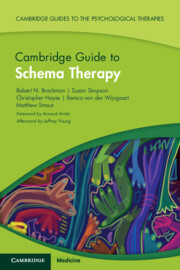Book contents
- Cambridge Guide to Schema Therapy
- Cambridge Guides to the Psychological Therapies
- Reviews
- Cambridge Guide to Schema Therapy
- Copyright page
- Contents
- Foreword
- Preface
- A Note from the Series Editor
- Acknowledgements
- Part I Overview of the Schema Therapy Model
- Part II The Model of Schema Therapy in Practice
- Chapter 3 Schema Therapy Assessment
- Chapter 4 Case Conceptualisation and Mode Mapping in Schema Therapy
- Chapter 5 Envisioning the Road Ahead
- Chapter 6 Intervention Strategies for Schema Healing 1
- Chapter 7 Intervention Strategies for Schema Healing 2
- Chapter 8 Intervention Strategies for Schema Healing 3
- Chapter 9 Intervention Strategies for Schema Healing 4
- Chapter 10 Building Connection to Healthy Modes
- Chapter 11 Bypassing Maladaptive Coping Modes to Support Change
- Chapter 12 Preparing for Termination and the End Phase of Schema Therapy
- Part III Applications and Adaptations for Mental Health Presentations
- Part IV Application of Schema Therapy in Different Populations and in Different Settings
- Appendix Interview Questions/Guidance for the Assessment Process (Chapter 3)
- Index
- References
Chapter 11 - Bypassing Maladaptive Coping Modes to Support Change
from Part II - The Model of Schema Therapy in Practice
Published online by Cambridge University Press: 27 July 2023
- Cambridge Guide to Schema Therapy
- Cambridge Guides to the Psychological Therapies
- Reviews
- Cambridge Guide to Schema Therapy
- Copyright page
- Contents
- Foreword
- Preface
- A Note from the Series Editor
- Acknowledgements
- Part I Overview of the Schema Therapy Model
- Part II The Model of Schema Therapy in Practice
- Chapter 3 Schema Therapy Assessment
- Chapter 4 Case Conceptualisation and Mode Mapping in Schema Therapy
- Chapter 5 Envisioning the Road Ahead
- Chapter 6 Intervention Strategies for Schema Healing 1
- Chapter 7 Intervention Strategies for Schema Healing 2
- Chapter 8 Intervention Strategies for Schema Healing 3
- Chapter 9 Intervention Strategies for Schema Healing 4
- Chapter 10 Building Connection to Healthy Modes
- Chapter 11 Bypassing Maladaptive Coping Modes to Support Change
- Chapter 12 Preparing for Termination and the End Phase of Schema Therapy
- Part III Applications and Adaptations for Mental Health Presentations
- Part IV Application of Schema Therapy in Different Populations and in Different Settings
- Appendix Interview Questions/Guidance for the Assessment Process (Chapter 3)
- Index
- References
Summary
Although coping modes were needed as survival mechanisms earlier in the client’s life, in the present they block the capacity to emotionally connect with others and to achieve fulfilment of their needs. In schema therapy, experiential techniques are emphasised because information processing is enhanced in the presence of affect. All the methods and techniques described herein rely on the schema therapist empathically bypassing any coping modes that block the client from experiencing their Vulnerable Child mode. A range of techniques are described, including labelling, interviewing coping modes, chairwork to bypass coping modes, implicit assumption technique, and empathic confrontation. Variations in chairwork include Contamination of the Chair to access Vulnerable Child, and Therapist Plays the Vulnerable Child. Schema therapy relies on the client inhabiting Vulnerable Child mode to receive limited reparenting and corrective emotional experiences and messages that counteract outdated schema-driven messages. As this process unfolds, there is potential for the client to open up to new and unexpected ways of developing a revitalised capacity to connect with others in their own lives.
- Type
- Chapter
- Information
- Cambridge Guide to Schema Therapy , pp. 226 - 240Publisher: Cambridge University PressPrint publication year: 2023

